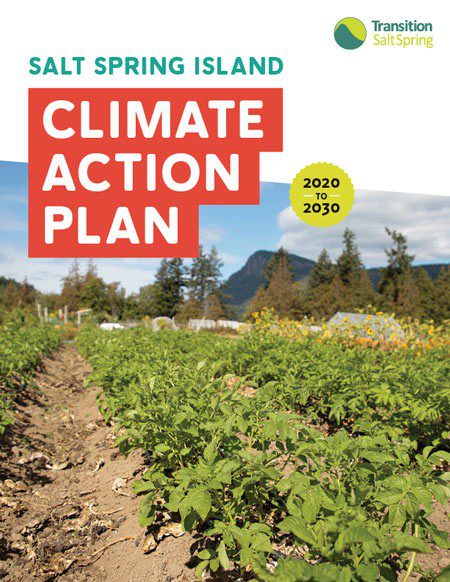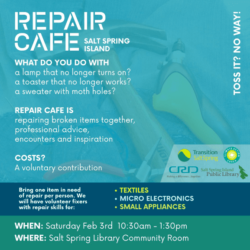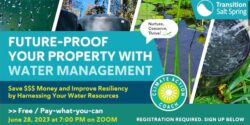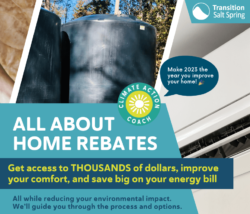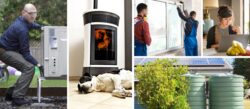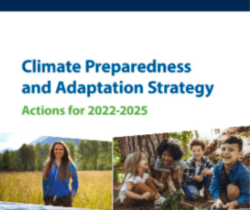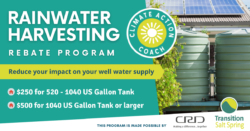Buildings and infrastructure are a significant source of greenhouse gas emissions (GHGs), responsible for over 12% of the island’s direct emissions.
Built infrastructure — everything from homes and roads to waste management facilities and sewage treatment plants — makes life possible for human communities on Salt Spring. We need to change how we build, where we build, and how we manage our island’s buildings and infrastructure to both lower our emissions and improve our climate change resilience in the challenging decades ahead.
These building blocks of the community face increased risks in the coming decades from climate-change-related extreme weather and sea-level rise. We need to plan now to protect existing and future assets in the context of a rapidly changing climate and increase the resilience and self-reliance of our community.
An additional consideration is the shortage of housing for the Salt Spring workforce. Aside from the community sustainability implications of the lack of equitable housing access on Salt Spring, the housing crisis also results in travel-related emissions from people commuting from off-island to on-island employment.
Resources, News & Events
Don’t Miss Salt Spring’s First Repair Cafe!
Slow Down Salt Spring Toy Swap
Slow Down Salt Spring Clothing Swap
Future-proof your Home with Water Management: $ave Money and Improve Resiliency by Harnessing Your Water Resources – Video
ALL About Home Rebates – Webinar Video
TSS Launches Updated Wood Smoke Reduction Rebates for 2023
All About Wood Stoves Webinar Video
Rebates available for Southern Gulf Islanders 2022/2023
BC Releases Climate Preparedness and Adaptation Strategy
Rainwater Harvesting Rebate Program
What Salt Spring Can Do
Much needs to be done to both decrease emissions associated with built infrastructure and prepare for climate changes already underway.
Priorities for infrastructure include:
1. Provide options for islanders to avoid open burning, which creates air pollution in addition to fire risk and GHG emissions. Solutions include an integrated chipping and composting facility for wood and wood waste and other compostables.
2. Help individuals, businesses and other organizations connect with applicable incentive programs and subsidies for climate-related projects.
3. Enable greater use of water conservation technologies such as rainwater harvesting, greywater reuse, and composting toilets through policy change, regulatory reform, incentives, and education.
4. Improve the performance of buildings and their operation by reducing the use of fossil fuels and combustion equipment for space heating and hot water, by increasing the use of more efficient heating systems and appliances, by encouraging energy retrofits and the use of building materials with low embedded energy, through information, incentives, facilitation and regulation.
5. Strengthen infrastructure resilience through expanded emergency preparedness, adoption of SSI-adapted Fire Smart measures, and more renewable energy installations to increase local energy security.
Success Stories
ECO HOME TOUR
Transition Salt Spring has been working on promoting sustainable building since our first biennial Eco-Home Tour in 2011! Unfortunately cancelled for 2021 due to COVID, we do have many resources about the tour, homes and contractors to be found here.
CLIMATE ACTION
Since the CAP 1.0 report was released in 2011, there has been progress towards creating climate change-resilient high-performance built infrastructure, which has lowered emissions and reduced climate risks, including:
- Location of the library in the downtown core rather than on donated land farther away and building it to the Leadership in Energy and Environmental Design (LEED) green building certification standard.
- Installation of emergency power capacity for NSSWD’s new water treatment plant on St. Mary Lake.
- Installation of a 21-kilowatt solar photovoltaic array on the Gulf Islands Secondary School roof, the largest of its kind in BC at the time of commissioning.
- Establishment of a community committee to coordinate key agencies including emergency responders, water utilities, and others in response to the December 2018 windstorm.
- Implementation of an online Salt Spring Island Sustainability Checklist and other guides produced by CRD and Islands Trust for new construction and renovations.
- Roll-out of a yard waste collection pilot — a part of the Agricultural Alliance central composting initiative in partnership with CRD PARC.
- The biennial Transition Salt Spring Salt Spring Eco Living and Home Tour to highlight ways islanders are reducing their carbon footprints at home.
- Increased uptake of heat pumps and domestic net metered solar photovoltaic installations as a result of Salt Spring Community Energy Society's education programming and conferences.
- Revitalization of the CRD Salt Spring Island “POD” neighbourhood emergency preparedness network.

